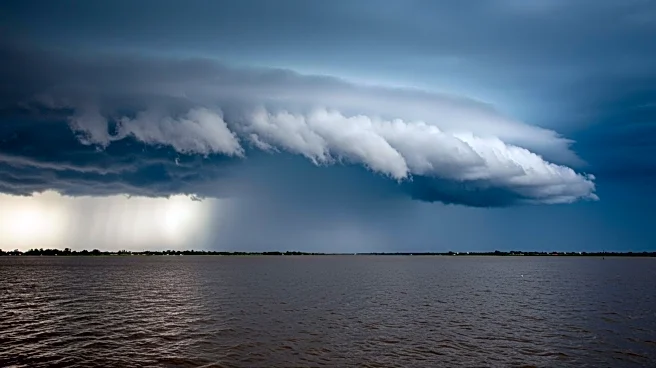What is the story about?
What's Happening?
In Pakistan's northwest, devastating floods have resulted in over 200 people missing in the Buner district, according to local officials. The floods, triggered by monsoon rains, have caused widespread destruction, with more than 300 fatalities reported across Pakistan and Pakistan-administered Kashmir. The mountainous Khyber Pakhtunkhwa province has been particularly affected, with landslides and flash floods burying villages and damaging infrastructure. Rescue operations are ongoing, but the severe damage to roads is hindering efforts to recover and identify bodies. The monsoon season, which delivers the majority of South Asia's annual rainfall, has been intensified by climate change, leading to more frequent and severe weather events.
Why It's Important?
The floods in Pakistan highlight the increasing impact of climate change on extreme weather events in South Asia. The devastation has significant implications for the region's infrastructure, economy, and public safety. With hundreds of people missing and entire villages buried, the humanitarian crisis is profound, requiring substantial international aid and long-term recovery efforts. The situation underscores the urgent need for improved disaster management and climate adaptation strategies in vulnerable regions. The economic impact is also considerable, as the floods disrupt agriculture and other industries, potentially leading to food shortages and economic instability.
What's Next?
The Pakistani government and international relief agencies are expected to intensify rescue and recovery operations in the affected areas. Heavy rainfall is forecasted to continue until August 21, which may exacerbate the situation. Authorities are likely to declare more areas as disaster zones, necessitating further aid and resources. Long-term, there may be increased focus on climate resilience and infrastructure development to mitigate future disasters. The international community may also play a role in supporting Pakistan's recovery and adaptation efforts.
Beyond the Headlines
The floods in Pakistan raise ethical and environmental concerns about the impact of climate change on vulnerable populations. The rapid melting of glaciers in northern Pakistan, exacerbated by global warming, contributes to the instability of mountain regions, increasing the risk of landslides and floods. This situation calls for a reevaluation of environmental policies and international cooperation to address climate change and its effects on developing countries.
















